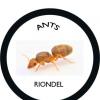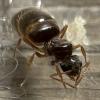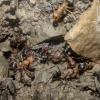Hi All!
I'm gonna try hard to post on formiculture more. I realize I've been less than active in the last couple years.
I wanted to show you guys our Aphaenogaster tennesseensis breeding project. Currently, all of our small colonies of Aphaenogaster tennesseensis and Aphaenogaster rudis/picea are captive bred (or artificially induced mating). I don't want to give away the secrets too much, but UV light exposure seems to be extremely important for this species. Light exposure, temperature, humidity, air flow, changes in light exposure, and various chemical stimulants are just some of the things we've been working with. The goal is to have Pogonomyrmex occidentalis, Pheidole spp, Messor spp, Formica pallidefulva, Formica neorufibarbis, Manica, and a couple other species be fully captive bred within the next couple years.
We've replicated these methods several times with 4-5 partners across southern Ontario with their local populations. The video below is one such example. We are now producing around 70 queens of this species per year, although we are still dependent on alates collected from wild colonies to supplement, we are currently rearing multiple growing colonies so that everything will be sourced from a controlled setting
Aphaenogaster tennesseensis breeding in captivity - YouTube
Either way, there's a lot of potential here for future growth in the hobby this way, particularly moving away from wild collection, inconsistent sources of queens, and parasites (maybe even breeding specific lines or colour variants).
We're currently selling Aphaenogaster tennesseensis colonies with boosted workers for 76 CAD or 56 USD (not that we ship to the US). These colonies are more or less guaranteed fertile with confirmed pairings and are parasite free. Currently we're working on artifically inducing queen production with juvenile hormone and analogs. Although, I'm somehow always struggling to get enough males in the colonies, LOL.
You can support us by grabbing a colony here at Canada Ant Colony (canada-ant-colony.com)
Edited by Canadian anter, September 19 2023 - 9:33 AM.

















